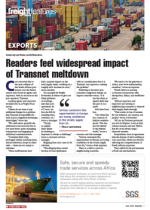Flexibility, automation and data quality are shaping DSV’s drive to enhance its mining sector-led exports into Africa.While export volumes are generally under pressure as load shedding, infrastructure issues and declining manufacturing take their toll, Andrew Thomson, ocean export manager, DSV Air & Sea, said he remained optimistic.“We operate across different industries, so as one struggles another does well, which helps mitigate our risk during downturns in some industries. And importantly, we are always out looking for new opportunities.”Thomson said the company’s ocean exports division had two teams, one focusing on general cargo and the other on mining-related cargo, a specialist and growing sector. According to the South African Revenue Service, mineral products accounted for 21% of all exports into Africa in 2023.“Mining is complex in terms of planning and handling, and the need for special facilities and infrastructure. For example, you may need a 50-ton crane to lift large pieces, and you need the expertise to manage this equipment. Because of its scale, mining requires deep levels of expertise,” said Thomson.Data quality and visibility are big drivers across the sector. Thomson said those who got left behind would feel the effects in time because it was becoming a significant differentiator. “A DSV customer, for example, who wants to check on a shipment at eleven o'clock at night can do so by logging on to myDSV, our online app,” explained Thomson. Both data quality and visibility are also important from a sales perspective and DSV, which has traditionally grown its business through mergers and acquisitions, is focusing more on organic growth – and data quality and visibility are key selling points.While mining in South Africa is going through a difficult time, there are exciting projects in Africa.An accelerating trend in some African markets is a push for local procurement, and this could alter trading patterns and logistics needs. “We might have a relationship directly with a mine from a South African perspective, but now the relationship will move because the mine will need to have a relationship in-country, and if the person in-country doesn't have a relationship with DSV or prefers to source elsewhere, that could affect volumes if we don’t adapt to the changing needs.”Ocean freight has experienced well-documented difficulties at South African ports, and Thomson said clients, exporters and freight agents were looking for alternatives to mitigate risk, with Walvis Bay in Namibia, Mombasa in Kenya and Beira in Mozambique among the beneficiaries. “Product is being shipped out of competitor ports, and while it may not be a fully committed change yet, it’s happening and we must explore alternatives too.”These port challenges play into DSV Road’s strengths. While you can’t road freight heavy equipment all the way from South Africa to West Africa, it is an option for East Africa, and customers don’t want their eggs just in the ocean freight basket any more, he said.

